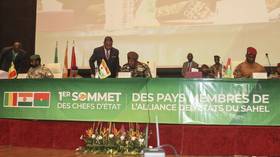Sahel military governments establish confederation

The military rulers of Burkina Faso, Mali, and Niger have established a confederation alliance by signing a treaty at their inaugural summit in the Nigerien capital of Niamey on Saturday. It follows their recent decision to cut ties with the existing Economic Community of West African States (ECOWAS).
The summit was intended to further consolidate the AES union (Alliance des Etats du Sahel in French, the Alliance of Sahel States), the establishment of which was announced last September. Back then, Burkina Faso, Mali, and Niger signed a charter, agreeing to help each other in the event of external aggression or internal threats to their sovereignty.
Mali has assumed the chairmanship of the alliance for a one-year term. Burkina Faso will host the first special session of ministers for the confederation comprising the three African nations, according to a statement issued after the trilateral summit in Niger.
“On this historic day for our peoples, I am pleased to sign, together with my brothers from Burkina Faso and Niger, the documents for the operationalization and creation of the AES confederation. I am honored that Mali has been chosen as chair country,” Mali’s transitional president Assimi Goita posted on X (formerly Twitter).
Following the summit, a communique was released stating that the nations had agreed to coordinate diplomatic efforts, create an AES investment bank, and combine their resources to develop projects in strategic sectors such as mining, energy, and agriculture. In March, the three countries decided to establish a joint force to address security threats within their territories.
The charter was signed by the three transitional heads of state: Mali’s president Assimi Goita, Nigerien leader Abdourahamane Tchiani, and the president of Burkina Faso, Ibrahim Traore.
The signing took place a day before the ECOWAS summit, which hopes to change the decision of the three countries to leave the bloc. However, the Sahel states have ruled out returning to the West African economic bloc. Tchiani described the AES summit as “the culmination of our resolute collective will to reclaim our national sovereignty.” “Our peoples have irreversibly turned away from ECOWAS,” the Nigerien leader said.
Ouagadougou, Bamako, and Niamey have accused the West African political and economic bloc of posing a threat to their sovereignty by serving as a tool for foreign powers, particularly France, with whom they have severed military ties.













